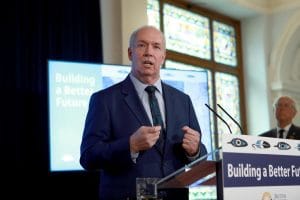Newly announced B.C. community programs for Japanese Canadians are aiming to recognize the historical wrongs during the Second World War. Premier John Horgan made the announcement at the B.C. to end fossil fuel subsidies under new oil and gas royalty system in Richmond on Saturday, saying the $100 million initiative will fund programs to restore heritage and education. The initiative was done through the National Association of Japanese Canadians (NAJC) and funding will be dispersed through enhanced health and wellness programs for internment-era survivors; creating and restoring heritage sites for all British Columbians to explore and learn, including a monument to honour survivors of the internment era; and updating B.C.’s curriculum to teach future generations about this dark chapter in B.C.’s history. Lorene Oikwawa, president of the NAJC, said the actions of the government will help heal the damage that had been done. “We honour the Japanese Canadian community, from babies to seniors, who, 80 years ago, were ripped from their homes, dispossessed and forced into exile until four years after the end of the Second World War. The B.C. government’s meaningful action will help redress the violation of rights and losses and set in motion a path to reduce systemic racism and safeguard against future injustices.,” said Oikwawa. This year marks 80 years since the internment of Japanese Canadians across B.C. and Horgan says families were uprooted and incarcerated because of the internment. “Eighty years have passed since the internment of thousands of Japanese Canadians. Families were uprooted and incarcerated, forced to leave behind the lives they had worked so hard to build. It was a cruel, racist act, and the injustice still resonates today,” said Premier Horgan. Related links: ‘Royal BC Museum has become a political football’: Premier defends plans amid backlash B.C. to end fossil fuel subsidies under new oil and gas royalty system Beginning in early 1942, more than 90% of Japanese Canadians living in B.C. were detained under the War Measures Act and were stripped of their homes, possessions and businesses. After the war ended, Japanese Canadians were given the choice to move east of the Rockies or go to Japan, a country many had never known. “Until 1942, Steveston was home to a large Japanese Canadian community with a thriving fishing fleet. That was all taken away by the governments of the day as thousands were forced to leave their homes, boats and nearly every possession behind,” said Kelly Greene, MLA for Richmond-Steveston, in a statement. “The resilient Nikkei community has rebuilt since that tragic time, with the local community centre and martials art centre delivering a range of programs for Japanese Canadians. This funding will support Japanese Canadians in Steveston and across the province to reconnect with their culture and strengthen what was lost 80 years ago.” In 1949, four years after the end of the Second World War, Japanese Canadians were allowed to return to the West Coast. They were still subjected to racist policies and treatment for years, and many communities never recovered. Around 6,000 interned Japanese Canadians are alive today.
From: citynews1130
URL: https://vancouver.citynews.ca/2022/05/21/b-c-initiative-japanese-canadian-internment/



